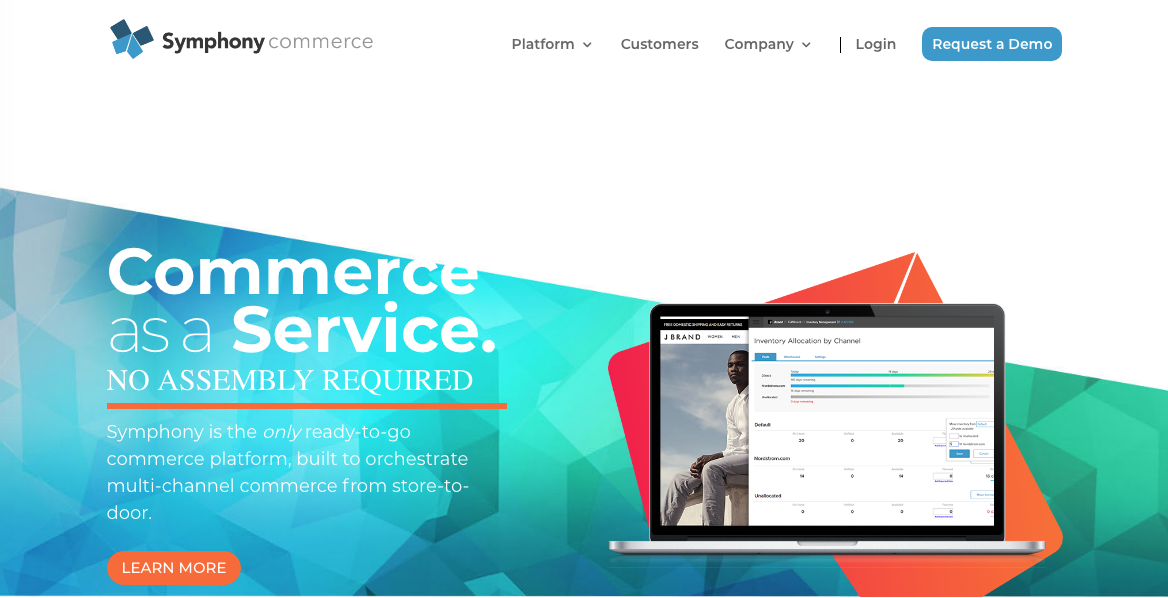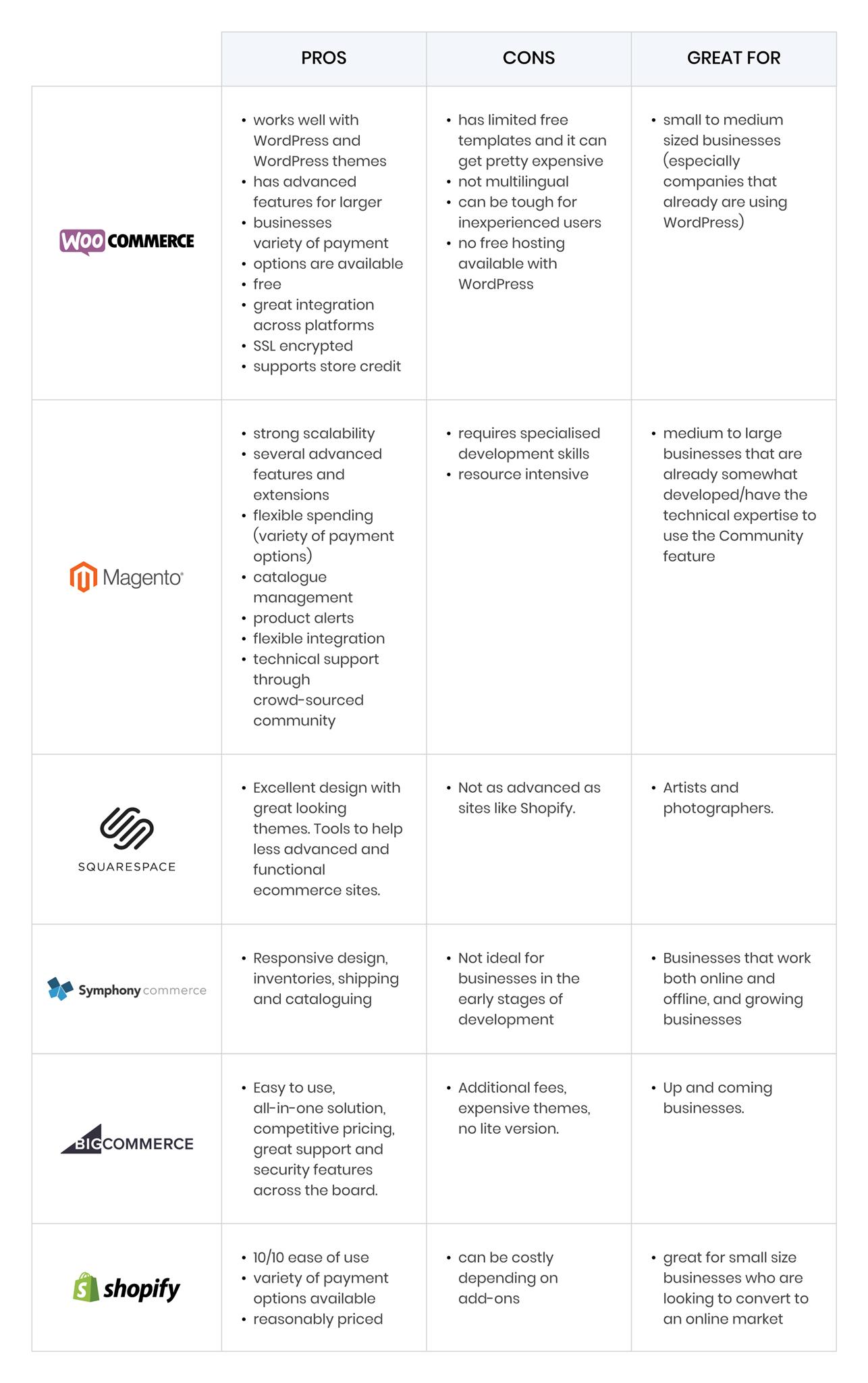Ecommerce is expected to reach a massive $1.5 trillion this year, which will represent a 20% increase from 2013. It is now the single largest driver of business to websites in the world marketplace. A Forrester Research paper demonstrated that by the end of 2013, business to business commerce spending reached a huge $559 billion in the USA alone. This has accelerated in the four years since. It is therefore absolutely imperative that you focus on how to choose the best ecommerce platform for a small business in order to give your business the best possible chance to grow.
In case you’d like to skip ahead…
- What can the best ecommerce platform do for a small business?
- Why should your small business use an e-commerce platform?
- Examples of successful ecommerce platforms for small businesses
- Best ecommerce platform for small businesses
- How to build an ecommerce platform

What can the best ecommerce platform do for a small business?
For a small business or indeed any business that sells online, your ecommerce platform is probably the most important part of your entire business plan. It is one thing having the finest products on offer within your chosen industry but if you don’t have a functioning checkout system you are doomed to fail.
Creating the best ecommerce platform for small businesses can be a tricky thing to get right. To get the right balance of cost effectiveness and ease of use can be extremely difficult for many small businesses to do in-house. This is where companies like Pangara come in. Most ecommerce platforms have their own inherent strengths and weaknesses; sometimes it is simply better to let professionals do the leg-work here.
The very best ecommerce platform for small businesses provides a method for those businesses to sell products and services online. Back in the day, they had to buy expensive commercial software systems that weren’t scalable. They were difficult to run and complicated when it came to making changes in the way they integrated with other systems and adapted to one’s specific needs. Nowadays, with the introduction of software as a service (SaaS) models, commerce platforms enable businesses to cover all aspects of ordering, cataloguing, running an inventory, selling and invoicing.
Why should your small business use an e-commerce platform?
Possibly the best example to use here is the Canadian site Shopify. Reportedly exceeding $45 billion annual business, this started out as a small commerce site selling snowboarding equipment. It started in 2004, but re-launched in 2006. After steady improvements to the business model, it launched an API platform in 2009 together with an App store. The flexibility and variability that they employed has enabled a small business to progress smoothly through huge changes in the business, making it one of the most successful ecommerce sites in the world.
It is this ability to stay functional throughout a company’s transformation that makes this type of software key. The trick is identifying your niche market and having the ability to change and grow as it does. Having skilled developers in this niche market doesn’t hurt either. If you’re in search of a Shopify developer, we can help.
As big as Shopify has become, it has maintained a 10/10 usability rating from sites like ecommerce platforms. It is this ease of use and flexibility that makes choosing the best ecommerce platform for small business of such paramount importance.
It is important that you choose a system that enables you to run your business on a single centralised platform. Having to constantly integrate between different systems is unwieldy and will create problems. It is absolutely crucial that you can present your entire catalogue, manage your accounts, run your point of sale, keep an accurate inventory, manage, market your products and provide an excellent customer service to your clients. This is all necessary to keep your customers coming back to you.
Managing your orders is again, crucial. Your customers will get used to your service, but you need to continue to exceed their expectations by offering exciting new products that you feel will be of interest to them. By increasing the number of products they order at one given time you will maximise your profitability. At the same time you can view your inventory across different channels.
The best ecommerce platform for small businesses will also reduce the delivery time. It doesn’t matter how good your product is if the client gets fed up of waiting and cancels the order. We live in an age of now, now, now. Customer patience is getting shorter and shorter.
Examples of successful ecommerce platforms for small businesses
The best ecommerce platform for small businesses is one that gives the customer exactly what they need. Here are some examples of ecommerce platforms that do just that.
Magento
Magento offers a wide range of services and their ecommerce platforms are excellent. They give users the opportunity to customise and integrate their sites with ease. They claim that they provide three times the sales growth of other platforms; a claim that is backed up by the Internet Retailer Top 1000. Their 30-day free trial is very tempting for small businesses and demonstrates a confidence in their products. Magento uses cloud hosting, which means that they can handle your busiest periods yet maintain their fast service.
- Pros: Flexible pricing, catalogue management, product alerts.
- Cons: Requires specialised development skills, resource intensive.
- Suitable for: Medium to large, businesses that are already somewhat developed.

Squarespace
Squarespace is easy to use and perfect in helping new businesses develop. They have a variety of templates and one is bound to suit your needs. This of course is also an advantage as it means that you have no need to learn complicated coding order to use it. It can handle unlimited items of your stock and still allows you to take control of your inventory. Even tiny run-from-home businesses will benefit from using Squarespace. It is however limited when it comes to Search Engine Optimisation and customer relations management.
- Pros: Excellent design with great looking themes. Tools to help less advanced and functional ecommerce sites.
- Cons: Not as advanced as sites like Shopify.
- Suitable for: Artists and photographers.

WooCommerce
WooCommerce has developed into one of the most used ecommerce sites on the planet. It seamlessly converts WordPress sites into online shopping stores. So much so in fact that it was added to WordPress as a plug in, in 2015. This open source solution is available free of charge provided you have access to WordPress. WooCommerce comes with detailed video tutorials and, whilst there is no online support, it has a good online community of users. A 30 day free trial is available.
- Pros: Ideal advanced features for larger businesses, SSL encrypted, supports store credit.
- Cons: It has limited free templates and is not multilingual. It can be a struggle for inexperienced users.
- Suitable for: Small to medium sized businesses.

Symphony Commerce
As previously mentioned, SaaS platforms are extremely flexible. Possibly the greatest advantage of a SaaS system is that they work equally well, no matter how big or small your company is. They are however, best suited to businesses that are already up and running.
Symphony Commerce markets its product as a “commerce-as-a-service-provider.” By this they mean that they can work both digitally and in the non-virtual business world. It is often unusual to find companies now that specialise in both online and offline marketing. Symphony enables your company to focus on the most important part of your business, leaving the backend stuff and site architecture to them.
You pay Symphony as your business develops which means it is ideal for a small business that is experiencing good growth. However, if you are still in the very early stages then you would be better served by using a smaller site builder to run it, for example the aforementioned Squarespace.
- Pros: Responsive design, inventories, shipping and cataloguing.
- Cons: Not ideal for businesses in the early stages of development.
- Suitable for: Businesses that work both online and offline, and growing businesses.

BigCommerce
When it comes to the ecommerce industry, BigCommerce is one of the most popular and largest solutions available. One major factor that gives BigCommerce such a high ranking is that its users have the ability to create a full blown ecommerce site without having to purchase any hosting or themes at all. Some examples of companies who use BigCommerce include Schwinn, Payless, Toyota and more. Many users consider BigCommerce to be a direct competitor of Magento and Shopify.
One downfall of the solution that has caused quite a stir over the years is that the platform’s prices will continually rise as long as your business keeps growing. Like with any business, growth is always a goal so one can understand how upsetting this was to users at first. In addition to its ever-increasing fees, its themes do not come very cheap.
For up and coming businesses, this is a great solution, but if you plan on or if you’re on your way to earning more than $125,000 in revenue in a year, those fees will only keep rising and it might be a good idea to look elsewhere.
- Pros: Easy to use, all-in-one solution, competitive pricing, great support and security features across the board.
- Cons: Additional fees, expensive themes, no lite version.
- Suitable for: Up and coming businesses.

Shopify
This wouldn’t be a thorough list without including Shopify. As we touched on earlier, with over 325,000 online shops under their belt, this Canadian company has been able to dominate the market since their inception. Everything this solution has to offer is suitable for an ecommerce site.
They have over 100 store templates from which to choose and 1500 plug ins/ extensions. With online support running 24/7 they offer the complete package for burgeoning businesses. Their start up packages start at just $29 per month, though they are not the best for unique functionality.
- Pros: 10/10 ease of use, reasonably priced, variety of payment options available.
- Cons: Can be costly depending on add-ons.
- Suitable for: Great for small size businesses who are looking to convert to an online market.
Best Ecommerce Platform for Small Businesses
Picking one from the huge number of e-commerce platforms that are available is a difficult task. The website Top10Best makes BigCommerce as the winner with a rating of 9.8; describing it as “outstanding”. As we mentioned earlier, it is clean and easy to use and it even gives users the ability to manage their shipping and payments easily whilst listing products on Amazon, Ebay, and Facebook simultaneously.
In addition to BigCommerce, other notable solutions including Shopify and WooCommerce make the cut for the best ecommerce platform for s small business. Not sure where to begin? We’ve laid it all out for you in the table below.
How to build an ecommerce platform
To design and build you personalised ecommerce platform you need to follow these steps:
1: Create your unique product range
The first step to selling anything is to create your product. With online shopping you need to focus your mind on your product range and finalise exactly what it is that you want to sell.
2: Set your price structure
Good due diligence will enable you to judge the market and set your prices at a competitive level. If you are offering a unique product, then demand will probably decide this for you. But otherwise looking at your direct competition will enable you to set your prices. The online world does though offer a huge market compared to traditional high street shopping.
3: Research shipping costs
The world is your marketplace online, but with that comes inherent shipping costs. Some countries are easier than others when it comes to exporting products. It is a complicated business and real research needs to be done. It is pointless gaining a market in a far off land only to find that shipping costs are prohibitive. A huge percentage of consumers abandon online purchases due to shipping costs. If you are shipping large quantities than you can easily build shipping into your costs, but for small amounts this can be a big problem.
4: Choose the best ecommerce platform for a small business
A consultation with Pangara will certainly take a lot of the pain out of this process. We have the expertise and personnel to provide expert advice and guidance to ensure that you get the very best service providing you with the best possible chance of building a successful business.
5: Choose your brand name and buy a domain
This sounds obvious, but it isn’t. Online businesses have to have a name that not only means something and is unique, but also has to work as a domain name. The Internet is huge but with the incredible size comes complications. Domain names have to be searched for. So many businesses get this wrong. Choosing a name that has already been used in a different country is fine for a high street store, but for online business, there is only one marketplace.
6: Build your website
OK, you’ve done the research, now it is time for the work to begin. This is where Pangara comes into our own. This is probably the most important part of your business plan. Great care needs to be taken here in order to save unnecessary work at a later date.
7: Arrange payments
You will need a way of collecting your payments and a merchant account is the best way of dealing with this. There is a large range of options available to you. Household names like Paypal are available. There are also smaller companies that concentrate on small businesses, for example Bluepay and PaySimple. Do your research and choose the best one for your business. By doing this, the best ecommerce platform for a small business will integrate with these seamlessly.
8: Obtain an SSL certificate
Installing an SSL certificate will keep your customers’ private data safe. Your customers need to feel safe when dealing with you. Using their credit cards online is a huge act of faith on their part. They need to know that their details cannot be hacked.
You are now ready for business! All things checked and these processes adhered to, mean that you business is now in a position to start trading.
Summary
This guide will help you when it comes to finding the best ecommerce platform for a small business no matter what industry you’re in. It is imperative that you make clear and careful decisions when building your online business. So many businesses fail at these early stages. However failures are normally down to incomplete preparation. Contact us at Pangara for the best advice. We have the best personnel available that will ensure your business gets off to the best possible start.
